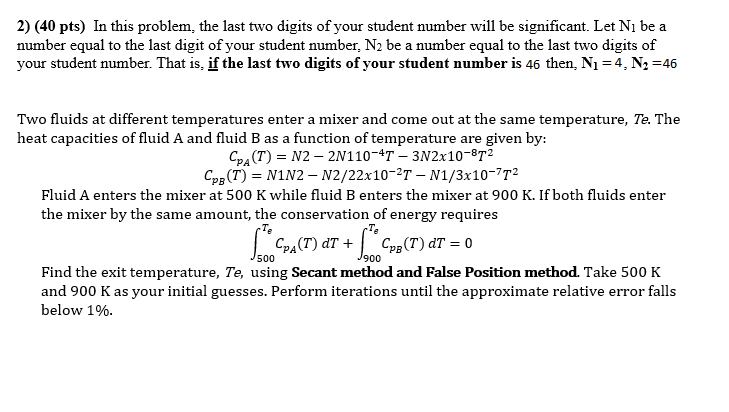Answered step by step
Verified Expert Solution
Question
1 Approved Answer
student number last two digit : 46 2) (40 pts) In this problem, the last two digits of your student number will be significant. Let

student number last two digit : 46
2) (40 pts) In this problem, the last two digits of your student number will be significant. Let Ni be a number equal to the last digit of your student number, N2 be a number equal to the last two digits of your student number. That is, if the last two digits of your student number is 46 then, Ni=4, N3 =46 Two fluids at different temperatures enter a mixer and come out at the same temperature, Te. The heat capacities of fluid A and fluid B as a function of temperature are given by: CpA(T) = N2 2N110-47 3N2x10-872 CpB(T) = N1N2 - 12/22x10-27 N1/3x10-772 Fluid A enters the mixer at 500 K while fluid B enters the mixer at 900 K. If both fluids enter the mixer by the same amount, the conservation of energy requires CPA(T) dT + Find the exit temperature, Te, using Secant method and False Position method. Take 500 K and 900 K as your initial guesses. Perform iterations until the approximate relative error falls below 1%. + ["Cro(7) dt = 0 500 2) (40 pts) In this problem, the last two digits of your student number will be significant. Let Ni be a number equal to the last digit of your student number, N2 be a number equal to the last two digits of your student number. That is, if the last two digits of your student number is 46 then, Ni=4, N3 =46 Two fluids at different temperatures enter a mixer and come out at the same temperature, Te. The heat capacities of fluid A and fluid B as a function of temperature are given by: CpA(T) = N2 2N110-47 3N2x10-872 CpB(T) = N1N2 - 12/22x10-27 N1/3x10-772 Fluid A enters the mixer at 500 K while fluid B enters the mixer at 900 K. If both fluids enter the mixer by the same amount, the conservation of energy requires CPA(T) dT + Find the exit temperature, Te, using Secant method and False Position method. Take 500 K and 900 K as your initial guesses. Perform iterations until the approximate relative error falls below 1%. + ["Cro(7) dt = 0 500Step by Step Solution
There are 3 Steps involved in it
Step: 1

Get Instant Access to Expert-Tailored Solutions
See step-by-step solutions with expert insights and AI powered tools for academic success
Step: 2

Step: 3

Ace Your Homework with AI
Get the answers you need in no time with our AI-driven, step-by-step assistance
Get Started


